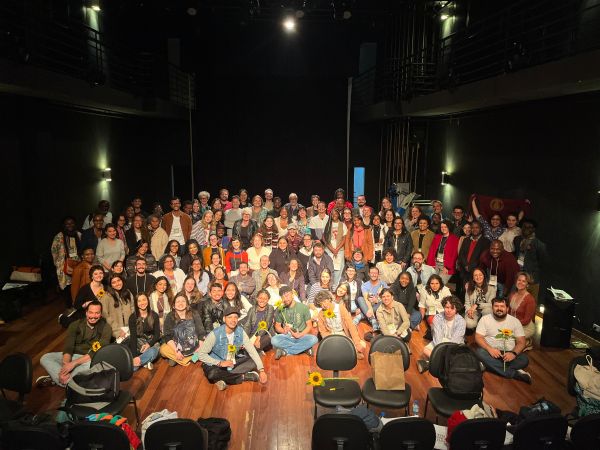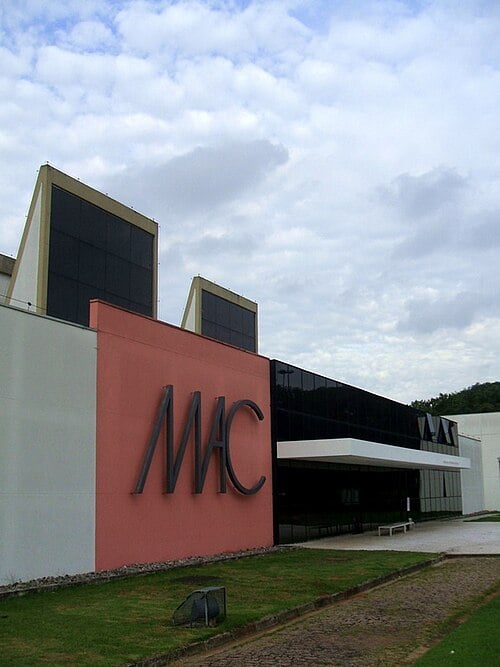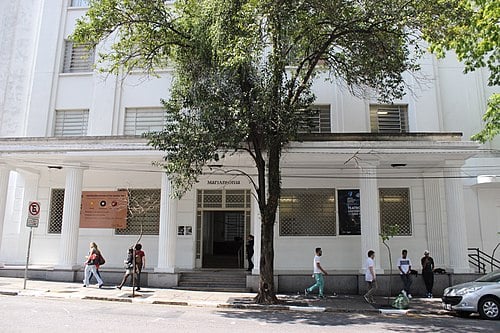
Students at the University of São Paulo (photo: provided)
.......
[M]emory, especially in societies shaped by violence and historical injustice, is never singular or linear. It is shaped by power, trauma, resistance, silence and ongoing struggles for recognition. Memory is often contested and fragmented, because different groups remember differently, and what is remembered or forgotten is deeply political.
.......
Introduction and academic background
As someone engaged in work around memory and memorialisation at Stellenbosch University, I attended the Winter School at the University of São Paulo (USP) with a deep interest in how societies confront legacies of violence, injustice and historical erasure. My master’s research focuses on Islamic education for schoolgoing children in Stellenbosch, examining how educational practices shape identity, belonging and cultural continuity within a diverse community. I have also been actively involved in a parallel body of work around memory and memorialisation in post-apartheid South Africa. This dual focus reflects my broader commitment to understanding how education and memory intersect to influence social justice and inclusion.
Alongside my academic research, I have been documenting and writing the stories of individuals such as Donavan Wanza, Frank Anthony, Ronald Carolissen, Walter Parry and Victor Honey, whose lives and contributions have largely been excluded from official narratives in Stellenbosch. They have narratives about resistance and personal endurance during apartheid. By bringing these stories to light, I seek to challenge the silences in public memory and promote a more inclusive and honest engagement with South Africa’s complex past, specifically regarding Stellenbosch.
Selection and diversity of participants
It was this commitment to reclaiming marginalised histories and fostering dialogue that led to my selection for the Winter School on University, Memory and Reparations, hosted by the University of São Paulo. From over 400 applicants, 100 participants were selected, with half from Brazil and half from other countries, including Argentina, Chile, Peru, Uruguay, the United States, Canada, Mexico, Germany, Spain, Turkey, Cyprus and Italy. The African contingent included participants from South Africa, Mozambique, Rwanda, Burkina Faso, Zambia, Nigeria, Sudan and Guinea-Bissau. What united us was a shared commitment to understanding how memory operates in post-violent societies, from military dictatorships in Latin America to the legacies of colonial rule, apartheid and conflict across the African continent, with a particular focus on how these histories are remembered, contested and often silenced among marginalised groups and sectors of society that remain largely invisible.
Programme structure and engagement
The Winter School’s structure was thoughtfully designed to foster genuine engagement. Each participant presented their work, received detailed feedback from others, and then had the opportunity to revise and improve their presentations. This iterative process was invaluable in deepening and refining our research. The experience was further enriched by site visits to memory spaces across São Paulo and presentations from experts in memory and reparations from Brazil, South Africa, the USA and Germany. These encounters grounded our academic reflections in lived experience and helped illuminate the emotional and political weight of memorialisation.
Institutional context at USP
For better context, it is important to discuss briefly the institutional structure of USP and explain where the programme I attended was situated within this framework. USP is organised into various administrative divisions that oversee different aspects of academic and campus life. Among these, the Office of the Provost for Inclusion and Belonging (PRIP) stands out as a key executive body, responsible for addressing both social and political dimensions within the university.
The role of the Provost for Inclusion and Belonging (PRIP)
PRIP is a key executive body at USP, responsible for addressing both the political and the social dimensions of university life. Universities are not neutral spaces; they are shaped by power, governance and decision-making that determine who has access, voice and opportunity. By engaging with these political aspects, the Provost ensures that issues of representation, justice and equity are actively addressed rather than ignored.
At the same time, the provost focuses on the everyday social experiences of the students, faculty and staff, fostering diversity, inclusion and well-being. Combining political awareness with social support, the office works to critically examine and transform structures of power, creating a more just, inclusive and democratic academic community. The provost operations find their expressions in the following five programmes:
- Campus life (Vida no campus) supports students’ daily needs, including food, housing, childcare, sports and overall well-being.
- Mental health and social well-being manages the university’s mental health network (ECOS), promotes counselling access and strengthens social support to address cultural and emotional stress.
- Women, ethnic-racial relations and diversities develops policies to combat gender and racial inequalities, supports persons with disabilities and migrant groups, and improves campus accessibility and inclusion.
- Education and professional life encourages academic and career growth, promotes diversity among the faculty and staff, and supports professional development opportunities.
- Human rights, reparations, memory and justice advances human rights education, addresses historical memory and institutional accountability, and supports reparative justice initiatives.
PRIP designs, implements and manages initiatives across all these domains. The Institute for Advanced Science, which hosted the Winter School programme, is situated within PRIP’s human rights, reparations, memory and justice area. This positioning highlights the Winter School’s close integration with USP’s broader mission to promote political and social transformation and equity. By operating within this area, the institute actively addresses historical injustices, supports reparative actions and fosters a culture of memory and justice, ensuring that the programme is both academically rigorous and firmly rooted in USP’s ongoing efforts to build a more inclusive and socially responsible university environment.
USP’s leadership in memory and reparations
USP holds a central place in Brazil’s ongoing efforts around memory, justice and reparations. Through its academic leadership, cultural institutions and public programmes, USP is not only a major educational institution, but also a vital space for confronting the country’s historical injustices and fostering democratic dialogue. At the forefront of this work is the Institute for Advanced Sciences, which leads interdisciplinary programmes focused on human rights, historical memory, reparative justice and social transformation.
Among the most powerful manifestations of this work are three university museums. These museums reflect USP’s commitment to preserving memory, acknowledging harm and contributing to reparative efforts across Brazil.
University museums

Museum of Modern and Contemporary Art at the São Paulo University (photo: provided)
Museum of Modern and Contemporary Art (MAC USP): Located near Ibirapuera Park in a modernist building designed by Oscar Niemeyer, MAC is one of Latin America’s most significant museums of modern and contemporary art. It houses over 8 000 works by artists such as Tarsila do Amaral, Pablo Picasso, Joan Miró and Lygia Clark. The museum is also a centre for teaching and research, offering postgraduate programmes in art history and criticism. MAC contributes to the broader memory and reparations project by creating space for reflection on identity, inequality, resistance and the role of visual culture in social transformation. It is not only a cultural site, but also a space where historical awareness and critical engagement are cultivated.
Museu Paulista (Museu do Ipiranga): The Museu Paulista is one of Brazil’s most iconic historical museums. Located at the site where Emperor Pedro the First declared Brazil’s independence in 1822, the museum reopened in 2022 after extensive renovations. Its architecture, inspired by the Palace of Versailles, evokes Brazil’s imperial past, but its exhibitions have been reimagined to include a wider and more critical perspective on national history. With over 450 000 objects, the museum tells stories not only of political events, but also of everyday life, social change and struggle. Through the involvement of the Institute for Advanced Science and PRIP, the museum now engages with the legacies of slavery, exclusion and resistance, shifting away from celebratory nationalism toward a more inclusive and truthful historical narrative.
Maria Antônia University Centre: Occupying two historic buildings in central São Paulo, this centre was once part of the Faculty of Philosophy, Sciences and Letters. During the 1960s, these buildings became sites of intense political activism and student resistance against the military dictatorship, most notably during the confrontation known as the Battle of Maria Antônia in 1968. Today, the centre serves as a cultural and educational space that hosts exhibitions, debates and seminars related to memory, art and human rights. It is also home to the Maria Antônia branch of the Museu da Pessoa, which preserves testimonies from individuals who experienced state violence and repression. The transformation of this politically charged site into a space for public education and reflection is one of USP’s most powerful contributions to memory and reparations.
Together, these three museums form an essential part of USP’s role in addressing Brazil’s historical injustices. They are not only repositories of knowledge and culture, but also living institutions committed to justice, inclusion and repair. Through the coordinated efforts of the Institute for Advanced Science and PRIP, USP has positioned itself at the heart of Brazil’s debates on memory and reparations. It shows how a university can become an active agent in building a more just society by preserving the past, acknowledging harm and opening space for critical reflection and collective healing.

Maria Antônia University Centre (photo: provided)
Visits to memory sites
As part of the Winter School, all participants visited these three major USP museums: the Museum of Contemporary Art, the Museu Paulista and the Maria Antônia University Centre. In addition to these, we were divided into smaller groups to explore other significant sites of resistance and memory across São Paulo.
I participated in sessions held at a former torture chamber used during the military dictatorship, which offered a stark reminder of the brutal repression that shaped recent history in Brazil. We also visited a house donated to the university that now serves as a space for reflection on how mental illness was addressed in the past. This house raises critical questions about care, institutional violence and social exclusion. These visits made it clear that memory is never singular or straightforward. It is layered, complex and often filled with contradictions. Each site brought forward different dimensions of historical trauma and collective remembrance, from political repression to medical histories and social marginalisation. What united them was the urgent need to acknowledge memory as contested, evolving and deeply emotional.
The complexity of memory
........
[T]he choice to represent memory in a multilayered and complex way is itself an ethical and political decision that refuses simplification and honours the diverse experiences and truths that emerge from history.
........
One of the most important insights gained from this experience was the necessity of consciously conveying the complexity of memory. During one of our discussions, I asked Professor Renato Cymbalista, head of the Institute of Advanced Science, why the narratives of memory are so multilayered and not straightforward. His response helped me understand that memory, especially in societies shaped by violence and historical injustice, is never singular or linear. It is shaped by power, trauma, resistance, silence and ongoing struggles for recognition. Memory is often contested and fragmented, because different groups remember differently, and what is remembered or forgotten is deeply political. Importantly, the choice to represent memory in a multilayered and complex way is itself an ethical and political decision that refuses simplification and honours the diverse experiences and truths that emerge from history. Rather than reducing the past to neat narratives, we must commit to telling stories that embrace these contradictions, tensions and uncertainties. This approach allows for a deeper and more honest engagement with history and creates space for marginalised voices to be heard. In doing so, we resist the urge to produce a single, sanitised version of the past, and instead foster conditions for meaningful reparations, collective healing and long-term social transformation. Memory, as Professor Cymbalista emphasised, must remain open, layered and alive if it is to support real justice and change.
Academic insights
Engaging in academic research, particularly within contexts marked by historical injustice and social inequality, requires a thoughtful and reflective approach. This section offers insights into two key areas of academic practice: ethical clearance and academic writing. Ethical clearance is not merely a bureaucratic hurdle, but a vital process that requires us to think critically about power, responsibility and the protection of research participants. Similarly, academic writing is more than the production of knowledge; it is shaped by voice, positionality and the need to challenge dominant frameworks. Together, these reflections highlight how ethics and writing are deeply intertwined with the politics of knowledge production in post-conflict and postcolonial contexts.
Ethical clearance: During a session at the Maria Antônia University Centre, I asked the professor overseeing the museum about the ethical clearances used for their exhibitions. Her response was direct and thought-provoking: they do not follow any formal ethical clearance process. This stood in stark contrast to the highly regulated approach familiar to me at Stellenbosch University, where ethical clearance has become a legalistic and institutional procedure. This experience recalled a workshop discussion where the point was made that unless we fundamentally rethink the meaning of ethics, universities will struggle to participate in genuine social transformation. At Stellenbosch, ethics is often narrowly framed as a protective mechanism focused on compliance, safeguarding the institution from reputational or legal risk. In this framework, accountability is inward-facing, designed to reassure the university rather than the communities it serves.
My experience working with communities tells a different story. People want to speak and share their histories, their pain, their hopes and their perspectives. They do not ask for academic clearance; they ask to be listened to with respect and responsibility. Real ethical engagement begins with building trust, recognising power dynamics and being present in meaningful ways.
USP, one of the top universities globally and the leading institution in Latin America, demonstrates a different understanding. Accountability is public-facing, embedded in the social mission of the university to serve and respond to society’s needs. This approach reflects a relational sense of ethics rooted in dialogue, participation and care.
This difference should prompt serious reflection for institutions like Stellenbosch. When ethical clearance becomes a shield rather than a bridge, we risk losing the very people we claim to represent. Ethics should never be used to silence or delay stories that need to be told. If we want our work to matter beyond the university, ethics must prioritise accountability to people, not just to the system.
Academic writing: Another transformative insight from the Winter School was about academic writing. One of the most refreshing ideas I encountered was that academic writing should focus less on extensively quoting others and more on the author’s contribution. Your voice, insights and experience are what give your work its value.
While engagement with existing literature is important, it should not overshadow your argument or positionality. Writing is a political and ethical act shaped by who you are, where you come from and what you believe. Embracing this ownership strengthens scholarship, making it more authentic and grounded, and bridging theory and experience.
This approach demands responsibility for your ideas rather than hiding behind citations for validation. Academic writing need not be impersonal or detached; sincerity and clarity about your position enhance the legitimacy of your work. As Professor Cymbalista so aptly put it, “Your writing must reflect your intellectual autonomy; it should show how you think, not just what others have thought.” Writing is not just a technical exercise; it is about telling the truth as you see it and owning that truth fully. This, we were reminded, is where real scholarship begins.
Conclusion
This writing piece provides the context for my reflections on the Winter School. This intellectually and emotionally enriching experience broadened my understanding of how memory, education and justice intersect across diverse global contexts. It reaffirmed the importance of international dialogue, site-based learning and ethical responsibility in shaping more just and inclusive futures.

